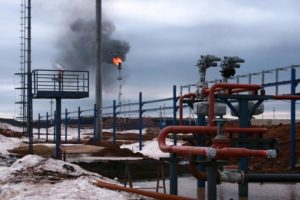
10 Environmental Groups Sued EPA to Require Updating of Decades-Old Standards for Pollutants from Petrochemical Plants and Tanks
Washington, D.C. – Ten environmental groups have signed a pair of consent decrees with the U.S. Environmental Protection Agency that will require EPA to consider updating and strengthening its standards for flares used to control air toxics and other air pollution from many petrochemical plants and storage tanks.
EPA has not updated its standards for flares at these facilities in at least 26 years, allowing plants to release excessive amounts of hazardous air pollutants and volatile organic compounds into low-income communities of color, the environmental groups, led by the Environmental Integrity Project, argued in an October 2020 lawsuit against EPA.
“We are pleased that EPA has agreed to conduct these long-overdue reviews of its standards for air pollution from petrochemical plants and other industrial facilities,” said Patton Dycus, an attorney at Environmental Integrity Project. “This is the first step for the agency to fix its old, flawed standards and better protect downwind communities from toxic air pollution from flares. EPA needs to overhaul its flare requirements to safeguard public health.”
The other plaintiffs are the Clean Air Council, Air Alliance Houston, Chesapeake Climate Action Network, Earthworks, Environment America, Environment Texas, Hoosier Environmental Council, Penn Environment, and Texas Campaign for the Environment.
The pair of proposed consent decrees, being filed today in the United States District Court for the District of Columbia, will—after they are officially approved by the court—require EPA to study and consider updates to its air toxics standards for flares and other polluting units at certain polymer, epoxy resin, non-nylon polyamides and resin petrochemical plants by March 31, 2023; and for marine tank loading operations by December 19, 2025.
The consent decrees will also require the agency to consider updating its standards for new and modified storage tanks holding volatile organic liquids—including the standards for flares controlling air pollution from those tanks—by September 29, 2023.
“Dangerous and excessive air pollution has no place in our communities,” said Joseph Otis Minott, Executive Director & Chief Counsel of Clean Air Council. “These consent decrees set the stage for EPA to clean up the thousands of flares burning at industrial sites across the country, which is welcome and much-needed progress.”
“Flaring at the numerous petrochemical plants and storage tanks in the Houston Area is a virtually routine occurrence,” said Jennifer M. Hadayia, Executive Director of Air Alliance Houston. “Just last week, we were subjected to a flare event that emitted enough air pollution to fill 2 million lungs. Houstonians have waited long enough for change, and we join our partners in acknowledging the important first step that EPA has taken today to hold polluters accountable and protect public health.”
“We know firsthand, from our many citizen enforcement suits in Texas, that petrochemical companies not only spew out enormous amounts of toxic pollution from open-air industrial flares, but they also grossly underestimate the amounts of those emissions,” said Luke Metzger, Executive Director of Environment Texas. “They do both because outdated EPA regulations let them, so it is welcome news for the people who live next to these facilities that EPA is going back to the drawing board. Now EPA must adopt standards that protect public health from this toxic air pollution.”
“Texans —mostly low-income and communities of color—have been poisoned by air pollution from plastics plants for far too long,” said Robin Schneider, Executive Director of Texas Campaign for the Environment. “This settlement is a big step in the right direction for people and communities whose health has been compromised for the profits of the plastics industry.”
Flares are pollution control devices designed to combust and destroy organic pollutants—including air toxics and smog-forming compounds—in waste gases from industrial plants. Petrochemical plants and other facilities that use flares are disproportionately located in and near communities of color and lower-income communities—neighborhoods that are often overburdened with toxic air pollution from multiple large sources.
Since at least 2012, EPA has recognized that its decades-old flare requirements cannot ensure that many flares properly destroy air toxics and other pollutants. For example, in 2015, the agency instituted more stringent requirements for flares at petroleum refineries to reduce their toxic air pollution. At the time, EPA estimated that the improved refinery flare standards would reduce hazardous air pollution by 3,900 tons per year and emissions of volatile organic compounds by 33,000 tons per year.
In 2021, additional plaintiffs Concerned Citizens of St. John, Louisiana Environmental Action Network, and Sierra Club brought a separate lawsuit concerning EPA’s review of the air toxics standards for polymers and resins facilities. One of the two proposed consent decrees being filed today would also resolve that lawsuit. For additional information about that lawsuit, please contact Erin Fitzgerald at Earthjustice (efitzgerald@earthjustice.org).
For a copy of the consent decrees, click here and here.
For a copy of a fact sheet on the case, click here.
The Environmental Integrity Project is a 20-year-old nonprofit organization, based in Washington D.C. and Austin, Texas, that is dedicated to enforcing environmental laws and strengthening policy to protect public health and the environment.
Media contact: Tom Pelton, Environmental Integrity Project (443) 510-2574 or tpelton@environmentalintegrity.org


